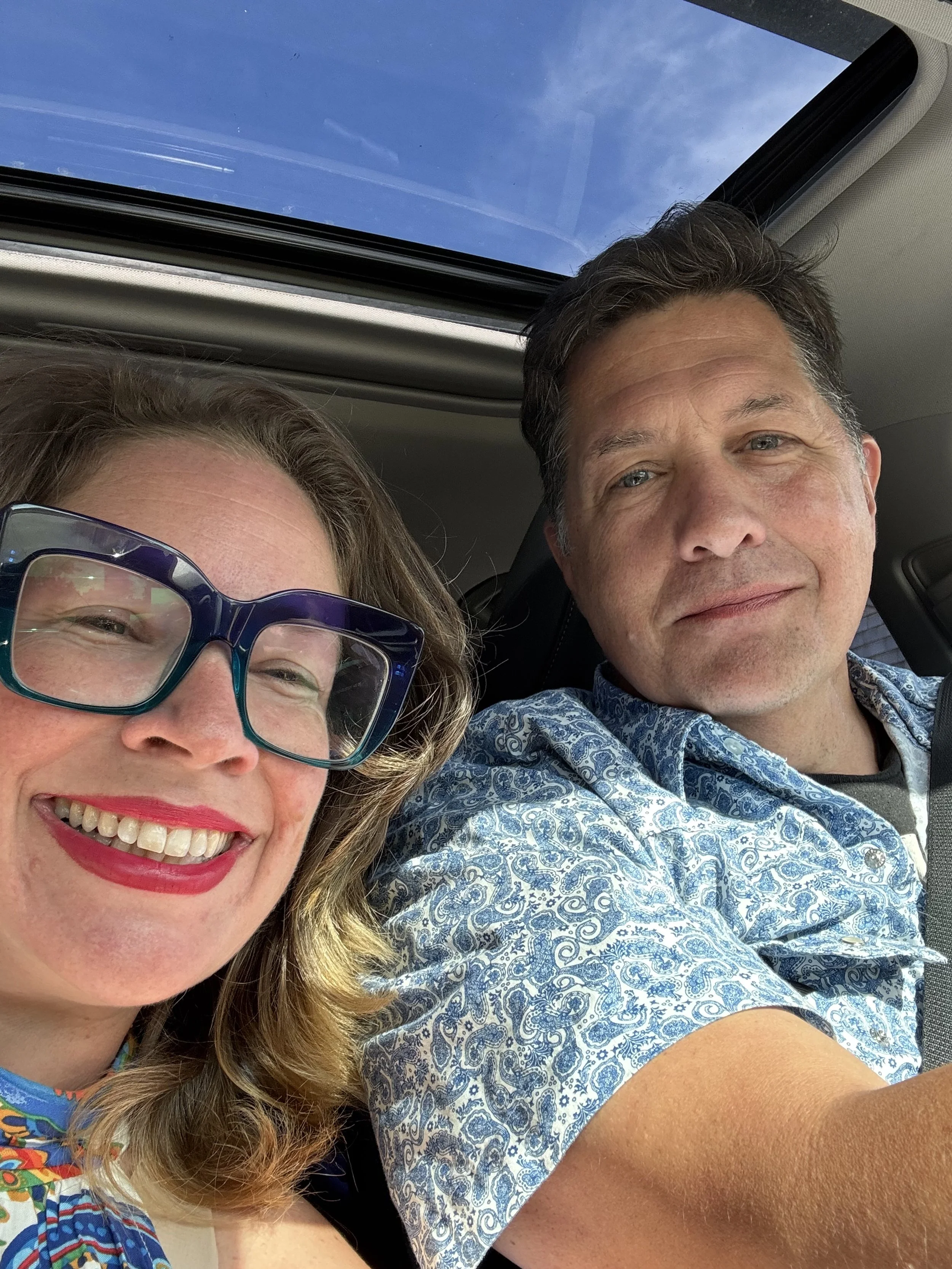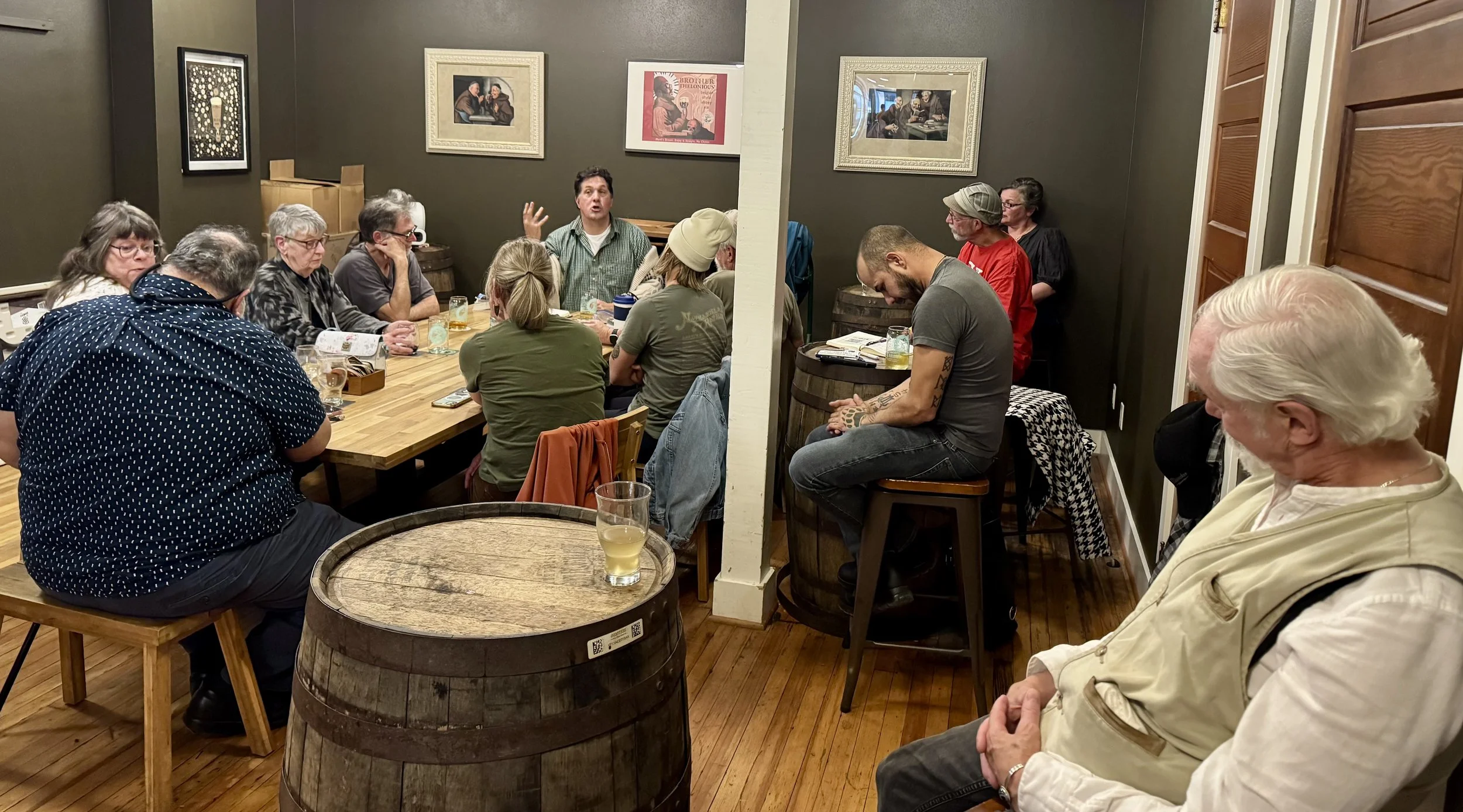Our Story
Most people think they're alone in wanting to think deeply. They know they're thoughtful, but think nobody else in their neighborhood is. Nobody at the bar next door. Nobody in the next town over.
They're wrong. And we can prove it.
The Road Trip: 2012
It started as a test. Seth had been teaching philosophy at universities for years, watching institutions care more about metrics than actual learning. Gad had failed the philosophy class that changed her life—not because she didn't understand it, but because she was actually doing philosophy instead of performing it for a grade. They both saw the same problem: the places supposedly built for learning had become more interested in their own survival than in helping people think.
So they left, loaded up a car, and headed down the West Coast with a simple plan: have as many philosophical conversations with as many kinds of people in as many places as possible.
They thought they'd stay with friends and spend days approaching strangers in coffee shops. That lasted about a week before they discovered Couchsurfing. Staying with people they already knew made it too easy to fall into familiar conversations. They needed to meet people who didn't know them at all.
Over the next couple months, they traveled down through Oregon and California, over to Utah, up through Montana, staying with roughly 30 strangers. Gad would eavesdrop at bars and join conversations mid-stream. Or they'd stand in grocery store lines talking about something philosophical, positioned so others could join in if they wanted. Seth jokes they're like Stockton and Malone—Gad gets in anywhere, and he delivers the philosophical goods.
The conversations came easier than they expected. That was the first surprise. People wanted to talk about deep questions. They just needed someone to start the conversation and take it somewhere interesting. They turned "that's a really good question" into a game—who could ask the question that would get that exact response, that head cock and far-off look. It honed their public philosophy skills fast.
But there were hard moments too. Gad worried about their physical safety when they stayed with someone whose grip on reality felt uncertain. Seth had his own crisis a couple weeks in, staring at the ocean in Long Beach, California, wondering how this journey could possibly continue, how they could make something lasting out of something so open and vast. There's a photo of him from that moment—hand on his chin, looking out at the water, trying to figure out if this mattered enough to keep going.
What We Found
A server at Fort George Brewery in Astoria named Shannon was always game for contemplating - she wondered whether mythic heroes had been replaced by celebrities. Fort George became like an incubation space—they'd go there to figure out how to explain what they were doing, and Shannon's thoughtfulness was part of why they decided to make Astoria home.
An insurance agent in Utah started talking to them in the produce department of a grocery store, sharing his belief that liberty was a counterfeit concept. A former gang member speculated about thoughts existing in eternity, then let them take photos as long as they promised never to put them on the internet. They've kept that promise. A grocer shared his story of being institutionalized, figuring out what words would make him sound sane, and breaking back in to get himself released.
The pattern was consistent. Someone would be talking about something they cared about. Eventually, something unexpected or paradoxical would surface in the conversation. . Gad or Seth would ask a philosophically tinted question. Then the person would cock their head slightly, get a far-off look, and say: "That's a really good question."
That's when they knew they'd brought someone into the project.
Everywhere they went, people insisted they were the thoughtful ones, but the folks across town weren't. So Gad and Seth would go there next. Turns out thoughtful people are everywhere. They're not rare or isolated to certain education levels or income brackets. The problem isn't that people don't think deeply—it's that ordinary circumstances don't make it easy to share that thinking with others.
People kept suggesting they visit college campuses. They refused. Philosophy was already available there, even if you had to pay tuition to access it. They weren't trying to prove that people already seeking knowledge would think deeply with them. They were trying to show how fundamental to being human it is to wonder about the world.
Also everywhere they went, people got excited about scaling the project. Make it national. Create a franchise model. This was 2012 San Francisco tech culture—move fast and break things, scale or die. Gad and Seth were skeptical. What they were building needed time to develop its own culture. Something didn't have to be large across space to matter. They decided to think about scaling across time instead.
Shannon wondering with us in 2012.
Nicole asked us to start the Death Cafe.
Dwayne our gracious philosophy deprived host at Bridge and Tunnel
Building Something That Lasts
In 2014, they gave their first official Philosofarian talk at Fort George Brewery in Astoria. The topic was "Should Technology Be Beautiful?" The place packed. Over 100 people showed up. They turned people away at the door, including Chris Novoselic from Nirvana, who lives in the area.
A year later, a Nicole who worked with a local bakery asked them to start a Death Cafe. The group loved the conversations but wanted to talk about more than death. That became The Last Refuge of Scoundrels, their discussion series. They started meeting Sunday afternoons at Blue Scorcher Bakery, a more closed environment where they could have deep conversations after hours.
In 2018, Seth gave a TEDx talk in Salem about philosophy as a right, not a luxury. The logic is straightforward: thinking isn't for the rich. Everyone does it. So why should wealth determine who gets better tools for something as fundamental as thinking?
When COVID hit in March 2020, they asked the group how they felt. Everyone agreed to pause. They picked back up almost exactly two years later in 2022, this time at Bridge and Tunnel Bottle Shop. The space was different—more open, more accessible. Dwayne, who owns the place, had never been able to attend their programming because he was always working. He wanted them there so he could drop in. (It hasn't quite worked out that way—his business is too successful and he's still always busy—but they're working on making sure Dwayne gets his philosophy fix.)
The move to Bridge and Tunnel changed things. At Blue Scorcher, they'd been tucked away after hours. At Bridge and Tunnel, people overhear. Regulars now include folks who just happened to be there one Wednesday and stuck around for the conversation.
The programming flourished: public talks where questions get messier before offering any response, discussion groups where the goal is understanding rather than winning arguments. Philosophy started showing up in unexpected places. This year, a local dive bar celebrating Labor Day—cover charge at the door, bands scheduled throughout the day—invited Seth to give a short reflection on the nature of work. A union representative welled up afterward and thanked him for the talk.
People in Clatsop County now think about inviting a philosopher when they're planning events. That's a kind of change that's hard to measure but easy to feel.
The Partnership
Here's the thing about Gad and Seth: they're different in ways that make this work possible.
Seth thinks in philosophical frameworks and historical context. He'll articulate an idea with precision and nuance, reference thinkers and traditions by name, patiently develop concepts before moving forward. He's comfortable with abstraction and theory.
Gad thinks strategically about practical implementation. She makes quick decisions, communicates directly, tests ideas by imagining specific audiences. She translates philosophy-speak into accessible language and focuses on what works, what's sustainable, what serves the mission.
They disagree all the time, especially about approach. Seth always wants to add another word to a talk title—a clarification, a qualifier that makes it more accurate. Gad dismisses this because it doesn't matter how accurate the title is if nobody shows up. Part of what they're trying to do is help people get more comfortable with philosophical precision, but they're not there yet. You have to start where people are.
Their most famous disagreement was about whether rocks could be conscious. They deeply disagreed the first time they had the conversation. Seth's coming around to Gad's point of view.
The dynamic works because Seth provides philosophical depth and rigor while Gad provides strategic framework and accessibility. He faces the horizon of knowledge; she looks back to see who's following and how to bring them along. He develops; she edits.
Philosofarian wouldn't exist without both of them. Seth wouldn't have left academia without Gad's encouragement (he jokes the only other option would've been moving to Thailand to live in a monastery). Gad wouldn't have known how to build what she wanted without Seth's decades of teaching expertise.
Where We're Going
The hope is simple: teach others enough and build a strong enough foundation of connection through philosophy that this work lives far longer than Gad and Seth do.
If Philosofarian succeeded beyond their wildest dreams, this place would become a model for what happens when philosophy is alive and breathing and thriving in a community. People would come from around the world to see it, learn from it, and take it home to figure out what their own community needs.
But that vision only works if it scales across time, not space. This isn't about franchising or creating a national movement. It's about building something sustainable here, doing it well, and letting others adapt the approach in ways that work for their communities.
Philosophy gives people access to their own thinking. It helps them understand why they think what they think, which prevents them from being manipulated into acting against their own interests. It connects people across differences by making assumptions visible and inviting curiosity about ideas different from their own.
Everyone should have access to this. Not because it prepares you for life, but because it is life.
Join Us
Come to a talk. Join a discussion on Wednesday nights at Bridge and Tunnel. Support the work financially if you can. Tell someone who might be interested.
The philosophical conversations are already happening. We're just making sure there's permission to have them, and that nobody has to think alone.
Because here's what we learned on that road trip in 2012, and what we keep learning every Wednesday night: thoughtful people are everywhere. They're not rare. They're not isolated to universities or certain income brackets.
They're here. They always have been.
They've just been waiting for someone to ask the right question.














